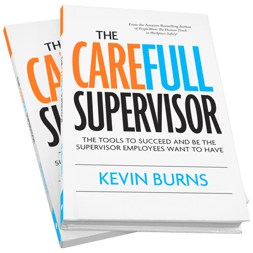Imagine being thrust into a leadership role overnight, suddenly responsible for the safety, productivity, and morale of an entire team—without any formal training or preparation. This is the reality for many frontline supervisors in industrial and trades-based companies. While they may have excelled as individual contributors, these newly minted leaders often find themselves grappling with a host of unexpected challenges and fears.

The transition from skilled worker to supervisor can be filled with anxiety, self-doubt, and the nagging fear of failure. These hidden fears not only impact the well-being and performance of the supervisors themselves but can have far-reaching consequences for team dynamics, safety records, and overall organizational success. By understanding and addressing these fears head-on, companies can transform apprehensive new supervisors into confident, effective leaders who drive their teams and organizations to new heights.
The 3 Fears of Supervisors
Let's explore the three primary fears of new frontline supervisors and how proper training can alleviate these concerns while boosting organizational performance:
-
Fear of Losing Credibility and Respect from Former Peers
Many frontline supervisors are promoted from within their teams, a practice that can lead to tricky social dynamics. New supervisors often worry about how their relationships with former coworkers will change and whether they'll be able to maintain friendships while also enforcing rules and standards.
Takeaway: Soft skills training in communication, emotional intelligence, and team building is crucial. By equipping new supervisors with these tools, they can navigate the delicate balance between authority and camaraderie. Training should focus on:
- Establishing clear boundaries while maintaining positive relationships
- Communicating expectations effectively
- Empowering employees and building teams with empathy and professionalism
Proper training helps new supervisors build confidence in their leadership role, allowing them to earn respect based on their leadership skills rather than just their technical expertise.
-
Fear of Making Critical Mistakes Impacting Safety or Productivity
In industrial settings, the consequences of errors can be severe. New supervisors often feel the weight of responsibility for their team's safety and performance, fearing that their decisions could lead to accidents, injuries, or costly production issues.
Takeaway: While technical training is important, it's equally crucial to provide supervisors with confidence-building and safety promotion skills. Training should include:
- Confidence-building skills to inspire their teams and create certainty among the team members
- Techniques for promoting a culture of safety and accountability
- Strategies for balancing productivity goals with safety concerns
By focusing on these areas, companies can help supervisors feel more confident in their ability to make sound decisions that protect both their team and the organization's interests.
-
Fear of Failing to Meet Management Expectations
New supervisors often feel caught between the demands of upper management and the needs of their team. They worry about how to balance competing priorities and prove their worth in their new role, especially if they lack formal leadership training.
Takeaway: Training programs should focus on helping supervisors understand their role within the larger organizational context. Key areas to address include:
- Setting and communicating clear goals aligned with company objectives
- Time management and prioritization skills
- Effective reporting and communication with upper management
By providing this broader perspective and these practical skills, companies can help supervisors feel more confident in their ability to meet expectations and demonstrate their value to the organization.
Set Supervisors Up For Success
Investing in comprehensive training for frontline supervisors isn't just about addressing these fears—it's about unlocking the full potential of your leadership team and, by extension, your entire workforce. When supervisors feel confident and well-equipped to handle their responsibilities, the benefits ripple throughout the organization:
- Improved safety records as supervisors create a culture of accountability and awareness
- Higher productivity as teams are better motivated and more efficiently managed
- Reduced turnover as employees feel more supported and see opportunities for growth
- Enhanced communication between all levels of the organization
- More innovative problem-solving as supervisors feel empowered to take the initiative
Remember, the skills that make someone an excellent frontline worker are not necessarily the same skills they need to be an effective supervisor. Technical expertise is important, but it's the soft skills—communication, leadership, emotional intelligence—that often make the difference between a good supervisor and a great one.
Where To Start?
For companies looking to take their frontline leadership to the next level, "The CareFull Supervisor" by Kevin Burns offers invaluable insights and practical strategies. This book can help bridge the gap between technical know-how and leadership excellence, empowering your supervisors to become the kind of leaders that employees genuinely want to work for and with.
By investing in the PeopleWork Supervisor Academy training for your frontline supervisors, you're not just addressing their fears and concerns—you're investing in the future success of your entire organization. When supervisors are equipped with the right tools and mindset, they can create a ripple effect of positive change, driving safety, productivity, and employee satisfaction to new heights. Don't leave the success of your frontline leadership to chance—empower your supervisors with the training they need to excel in their critical roles.





